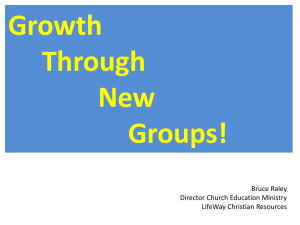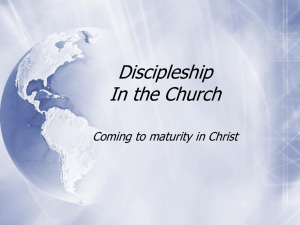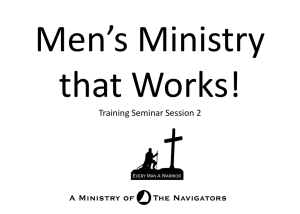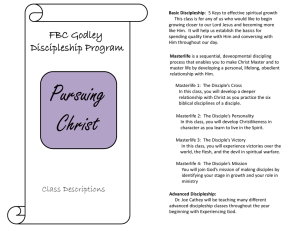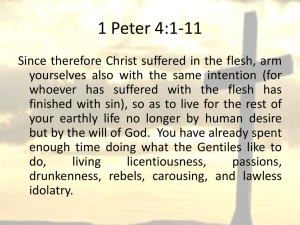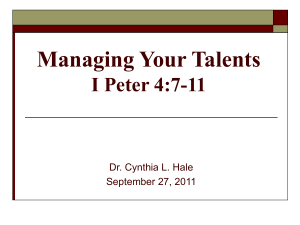From Membership to Discipleship
advertisement
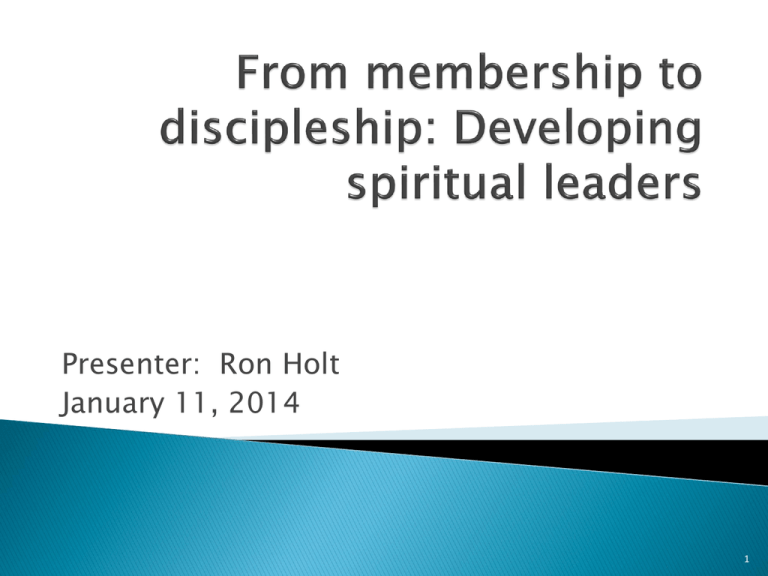
Presenter: Ron Holt January 11, 2014 1 • • • Spirit-filled, forward-leaning communities of believers that welcome all people (Gal. 3:28) Make disciples of Jesus Christ (Matt. 28:18-20) Serve like Christ through justice and mercy ministries (Micah 6:8, Luke 4:17-21) 2 • Inviting and inspiring worship • Engaged disciples in mission and outreach • Gifted, equipped and inspired lay leadership • Effective, equipped and inspired clergy leadership • Small groups and strong children’s programs and youth ministry 3 • Disciples worship • Disciples makes new disciples • Disciples engage in growing their faith • Disciples engage in mission • Disciples give to mission 4 5 THE VISION: To fulfill the Mission of The United Methodist Church by equipping and empowering congregations to become vital and healthy congregations in their communities and in our world. Matthew 28:18-20 Matthew 22:36-40 Romans 12 – “The Body of Christ” 6 The Critical Adaptive Challenge: To redirect the flow of attention, energy and resources to an intense concentration on fostering and sustaining an increase in the number of vital congregations effective in making disciples of Jesus Christ for the transformation of the world. 7 8 9 • Rethink church: Pastors/members/spiritual leaders must move our churches from being membership churches to becoming discipleship churches. • Examine the critical marks of leadership to help us become spiritual leaders. • Outline the marks of discipleship to assist us on our spiritual journey. • Tools and strategies to identify, explore and enhance spiritual gifts in our discipleship journey. 10 Developing principled Christian leaders for the church and the world. The denomination in the U.S. faces a crisis in clergy and lay leadership. Our leadership must expand and grow with the demands and expectations of the world. The church must recruit young people for ministry and provide them with the skills necessary to be effective in this new time of opportunity. That includes women and people of color the world over. Similarly, we must offer leadership training for lay people who are in ministry in countless ways. 11 “The failure to make disciple-making a priority is the basic cause of our current malaise and stagnation. It is the primary reason why our churches so often lack energy, excitement and vitality.” (Percy 2003:28) 12 • In today’s cultural, membership has come to imply prerogatives • The membership model has become the maintenance model • The membership model has had a loss of vision for the mission of the church • Tendency to define the congregation as exclusive rather than inclusive • The goal is discipleship, which is a matter of calling, giftedness and training (spirituality) – not title or position 13 In today’s cultural context, membership has come to imply prerogatives. In the Protestant explosion of the 1950s, membership implied obligation. 14 The membership model has become the maintenance mode. In the membership model, ministry focuses on the membership of a particular congregation. 15 The membership model has had a loss of vision for the mission of the church. The mission of the church – characterized quite simply as participation in God’s love in Jesus Christ for the world. 16 Tendency to define the congregation as exclusive rather than inclusive. The whole notion of the “church for others” has gotten lost. People act - consciously and unconsciously - to protect the “church for ourselves.” 17 The goal is discipleship, which is a matter of calling, giftedness and training (spirituality) – not title or position. • • • Discipleship is about individual Christians – and the church as a community of Christians – living together, living in mission. Spirituality is being attuned to the ways of God. The spiritual life is choosing them daily. 18 If the goal is discipleship, then the critical issue is leadership. 19 1. 2. 3. 4. 5. 6. Commitment to personal discipleship Ability to see and cast the vision Ability to contextualize the vision Ability to align community and vision Ability to continually communicate Ability to manage change 20 1. Commitment to personal discipleship The first critical element of Christian leadership is to lead from active, living faith 21 2. Ability to see and cast the vision Vision is not just the picture of the preferred future. It is also the picture of the desired present. 22 3. Ability to contextualize the vision A vision that is unrelated to the concrete realities and the real-life world of the congregation is little more than a pipe dream. 23 4. Ability to align the community and the vision The ability to enroll the constituency and align the institutional structures of the congregation to the vision. 24 5. Ability to continually communicate The fifth critical element of leadership is the will to keep creatively repeating the vision and inspiring those who follow to embrace it. 25 6. Ability to manage change Change that is not well-managed will fail and hurt the congregation and those who care about it. Insistence on continued implementation is critical to managing change. 26 1. 2. 3. 4. 5. 6. 7. 8. Establish a sense of urgency. Create a guiding coalition. Develop a vision and strategy. Communicate the change vision. Empower employees for broad-based action. Generate short-term wins. Consolidate gains and produce more change. Anchor new approaches in the culture. 27 Daily prayer Weekly worship Bible reading Service Spiritual friendships Giving 28 Daily prayer A discipleship church recognizes the need to teach people how to pray. 29 Weekly worship Those who lead in worship must worship – not just do a job. 30 Bible reading • • • • 91% of U.S. households own at least one Bible The typical household owns three Bibles 38% of U.S. adults read the Bible during a typical week, not including when they are at church The average Bible reader spends 10 minutes a day with the Scriptures. (George Barna, Data and Trends) 31 Bible reading The Bible is at the center of our life together, and this foundation of our individual lives of discipleship needs to be continually made evident. 32 Service The culture of a membership church assumes that the church, its staff and the “few who do everything” are there to serve the membership. 33 Spiritual friendships Spiritual friends pray for and with each other, share insights into Scripture, and help one another reflect on the ways God is present and active in their lives. 34 Giving A discipleship church teaches tithing as a reasonable, biblically based model for giving. 35 • • • First, we are continually reminded who the giver of all our abundance really is. Second, tithing has the capacity to put things of this world in perspective. Third, like all spiritual disciplines, tithing often leads people beyond their original expectations. 36 Gifts by the Holy Spirit – spiritual tools 10 truths about spiritual gifts The purpose of spiritual gifts Suggested gift assessment tool resources 37 • • • Identifying the gifts of the gifted is essential for moving a congregation from membership to discipleship. It’s a part of the culture of a discipleship church – identifying, affirming, encouraging and mentoring. God’s plan for the church calls for each member of the Body of Christ to play a vital role. 38 “Now about spiritual gifts I do not want you to be ignorant.” 1 Corinthians 12:1 A spiritual gift: A special ability given by the Holy Spirit to every believer at his or her conversion, to be used to minister to others and therefore build up the Body of Christ. 39 1. Only believers have spiritual gifts. 1 Corinthians 2:14 2. Every Christian has at least one gift. 1 Corinthians 7:7 3. No one receives all of the gifts. 1 Corinthians 12:27-30 4. No single gift is given to everyone. 1 Corinthians 12:29-30 5. You can’t earn or work for a spiritual gift. Ephesians 4:7 40 6. The Holy Spirit decides the gifts I get. 7. 1 Corinthians 12:11 The gifts I’m given are enduring. Romans 11:29 8. I am to develop the gifts God gives me. 1 Timothy 4:14 9. It’s a sin to waste spiritual gifts. 1 Corinthians 4:1-2 10. Using my gifts honors God and expands me. John 15:8 41 Not for my benefit, but for the benefit of others. “Each of you, as a good manager of God’s different gifts, must use for the good of others, the spiritual gift he has received from God.” 1 Peter 4:10 (GN) To produce maturity and harmony in our Church family. “It was he who ‘gave gifts to me’ … to build up the Body of Christ so we shall all come together to that oneness in our faith … and become mature. … Then we shall no longer be children, carried by the waves and blown about by every shifting wind.” Ephesians 4:11, 13-14 (GN) 42 • • • Jane A. G. Kise, David Stark and Sandra Krebs Hirsh, “Life Keys” (Bethany House Publishers, 1996) Charles V. Bryant, “Rediscovering our Spiritual Gifts: Building up the Body of Christ Through the Gifts of the Spirit” (Upper Room, 1991) Carol Cartmill & Yvonne Gentile, “Serving from the Heart: Finding Your Gifts and Talents for Service” (Abingdon Press, 2011) 43 UMCvitalcongregations.org Website resource designed to equip and empower leaders as they foster, sustain and nurture vital congregations in our denomination. • Simple • User-friendly • Easily accessible 44 Your church’s health and vitality depends on YOU! Church vitality can not happen without you • • • • • • • Acts 2 – The outpouring of the Holy Spirit and the birth of the Church. 1 Corinthians 12 – The healthy church is one body and it is the body of Christ. Ephesians 4:10-13 – Christ has gifted the church through a variety of gifts. Galatians 3:28 – All are welcome in the body of Christ. Luke 10:25-37 – We are called to be like the Good Samaritan. Micah 6:8 – Righteousness and justice are the expectation for God’s people. Luke 4:17-21 – Jesus announces his ministry, which is a calling for the body of Christ TODAY! 45 • • • “Your Church Can Thrive, Making the Connections that Build Healthy Congregations,” Harold Percy, Abingdon Press, 2003 “The Disciple’s Joy: Six Practices for Spiritual Growth,” Michael W. Foss, Augsburg Books, 2007 “The Servant Leader: Transforming Your Heart, Head, Hands & Habits,” Ken Blanchard and Phil Hodges, Thomas Nelson Inc., 2003 46 • “From Members to Disciples: Leadership Lessons from the Book of Acts,” Michael W. Foss, Abingdon Press, 2007 • • “Growing an Engaged Church: How to Stop ‘Doing Church’ and Start Being the Church Again,” Albert L. Winseman, Gallup Press, 2006 “Lead Like Jesus: Lessons from the Greatest Leadership Role Model of All Time,” Ken Blanchard and Phil Hodges, Thomas Nelson Inc., 2005 • “The Purpose Driven Church: Every Church is Big in God’s Eyes,” Rick Warren, Zondervan, 1995 47 A charge to keep I have, a God to glorify, a never-dying soul to save, and fit it for the sky. To serve the present age, my calling to fulfill; O may it all my powers engage to do my Master’s will! Arm me with jealous care, as in thy sight to live, and oh, thy servant, Lord, prepare a strict account to give! Help me to watch and pray, and on thyself rely, assured, if I my trust betray, I shall forever die. (Charles Wesley, 1707-1788) 48
